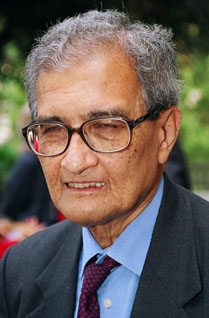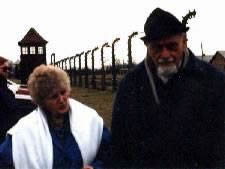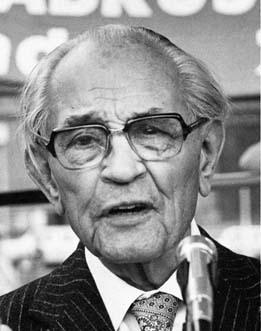"Christ is All and is In All":
Beyond Identity Violence and Social Hierarchies
For Sunday August 5, 2007
Lectionary Readings (Revised Common Lectionary, Year C)
Hosea 11:1–11 or Ecclesiastes 1:2, 12–14; 2:18–23
Psalm 107:1–9, 43 or Psalm 49:1–12
Colossians 3:1–11
Luke 12:12–2
 |
Professor Amartya Sen. |
Amartya Sen (b. 1933), Harvard professor and winner of the 1998 Nobel Prize in Economics, still remembers the day sixty-three years ago when Kader Mia stumbled into his family's front yard in Dhaka, Bangladesh. Bleeding from knife wounds and begging for help, Sen's father rushed Kader to the hospital where he eventually died. Sen's book Identity and Violence; The Illusion of Destiny (2006) explores this memory of his as a bewildered eleven-year-old boy.
Kader was a Muslim day laborer who was murdered by a Hindu thug, one of the thousands of people who died in Muslim-Hindu riots that erupted in British India in the 1940's. The strange thing, says Sen, was that even though the rioters shared an economic class identity as abysmally poor people, partisans demonized each other with a reductive "identity of violence." They reduced each other's humanity to religious ethnicity alone. "The illusion of a uniquely confrontational reality," says Sen, "had thoroughly reduced human beings and eclipsed the protagonists' freedom to think."
In this week's epistle the apostle Paul describes a radical alternative to every ugly manifestation of "identity violence." For those who follow Jesus, writes Paul, "there is no Greek or Jew, circumcised or uncircumcised, barbarian, Scythian, slave or free, but Christ is all, and is in all" (Colossians 3:11). The nearly identical version of this verse in Galatians 3:28 adds that "there is neither male nor female." We can add our modern equivalents—no Iraqis or Iranians, no North Koreans or North Vietnamese, no blue bloods or blue collar, no imperialists or terrorists, no gays or straights.
With a single sentence Paul repudiates the idea that humanity is fated to hate, that there is an inevitable clash of civilizations, or that class warfare is unavoidable. Contrary to the powerful and relentless propaganda that we are force fed, we need not succumb to race-baiting, to gay-bashing, to ethnic slurs and stereotypes, or to demonizing a nation as an enemy, an "evil empire," or "axis of evil." Instead of insisting that "you are either with us or against us," the Christian says, "I am unconditionally for you, no matter who you are, where you live, or what you've done. And God is for you far more than I could even wish to be for you."
Paul challenges the believers at Colossae to see every person as a human being who bears "the image of its creator" (3:10). To the Ephesians he employed a different but equally subversive metaphor; he says that Christ himself is our peace and that he shattered the many "dividing walls of hostility" that raise barriers between people (2:14).
Paul was not a romantic idealist mouthing pious platitudes, nor was he blind to the actual social conditions that existed in the churches of his day. He warned the Colossians about the "anger, rage and malice" that can destroy communities. He didn't imagine that gender identity was unimportant, that ethnicity shouldn't be celebrated, or that religion or your mother tongue don't matter. He didn't suggest that we should repudiate these markers of human identity.
Instead of repudiation Paul recommends renewal. Instead of letting these very real and powerful aspects of being human plunge us into "identity violence," Paul urges us to renew or transform them. He describes this renewal in several ways. It's like moving from death to life, like putting off your "old" self and putting on a "new" self, or like living in a "heavenly" rather than in an "earthly" way. It's nothing less than a return to or rediscovery of your basic humanity. If you look carefully enough, you can already see glimpses of this renewed social reality.
 |
Eva Kor and Hans Münch, a former SS doctor, lead a ceremony of truth and reconciliation at Auschwitz.. |
We see it among children. When I taught at a seminary in Nairobi in the summer of 1990, our family lived in the dormitory with students and their families. My son was seven at the time, and next to eating the delicious mandazi that were served at tea time every morning, his favorite part of the day was playing soccer with his Kenyan buddies. We have a "team" picture in which he's the only white boy among a dozen African kids. The first time we showed this picture to our friends back home he eagerly identified himself: "I'm the one in the red shirt!" I think that was the most color blind experience I've ever had.
Sometimes we see a renewed and transformed humanity among those who have experienced its worst evils. Eva Kor and her twin sister Miriam spent 10 months in Auschwitz. Along with many other twins they were subjected to Mengele's horrific experiments. When Kor returned to Auschwitz for the 50th anniversary of the liberation of the camps in 1995, she did the unthinkable: she read aloud her "official declaration of amnesty" to Mengele and the Nazis. Although some Jews were outraged at her act, Kor insisted that to extend forgiveness, without any prerequisites required of the perpetrators, was an "act of self-healing" that delivered her from the pains of her past.
Eva Kor reminds me of my friend Nate. Whenever Nate spoke to my classes about his experiences as a Holocaust survivor, he repeatedly rejected the idea of the "collective guilt" of all Germans. Instead of demonizing his enemy Nate affirmed that there were "good Nazis." One day when he was working in a warehouse he noticed a sandwich wedged between some boxes. Although he was starving he resisted taking the sandwich because he knew that it might be a trap. But a young Nazi guard kept silently nodding his head at Nate to take the sandwich; and so he did. When he walked past the Nazi guard to exit the warehouse, their eyes met and Nate saw tears streaking down his face.
There are powerful forces, some of them deeply personal and some of them overtly political, that try to extinguish the basic humanity that resides in every person. In the film Letters from Iwo Jima director Clint Eastwood tells the story of that battle from the vantage point of the Japanese, our enemies and the losers. 22,000 brave Japanese soldiers defended their island for forty days against 70,000 American troops; 20,000 Japanese and 6,800 Americans perished. In one scene a Japanese soldier reflects on a letter that he took from a dead American soldier: "We were taught that the Americans were cowards and savages. But when I read this letter from his mother, I realized that he was just like me and my mother."
 |
Pastor Martin Niemoeller. |
The German Lutheran pastor Martin Niemoeller (1892–1984) actively protested Hitler's anti-semite measures, and even spoke to the fuehrer in person. For that and other activities he was arrested and then imprisoned for eight years at Sachsenhausen and Dachau (1937–1945). But like the apostle Paul, Eva Kor, Nate, and the Japanese soldier on Iwo Jima, he saw beyond the tribalisms and social hierarchies that threaten to destroy us. Niemoeller once confessed, "It took me a long time to learn that God is not the enemy of my enemies. He is not even the enemy of his enemies."
For further reflection:
* Watch the documentary film about Eva Kor called Forgiving Dr Mengele.
* Cf. Amartya Sen, Identity and Violence (2006).
* Contemplate the words of CS Lewis from The Joyful Christian: "There are no ordinary people. You have never talked to a mere mortal. Nations, cultures, arts, civilization— these are mortal, and their life is to ours as the life of a gnat. But it is immortals whom we joke with, work with, marry, snub, and exploit— immortal horrors or everlasting splendors. This does not mean that we are to be perpetually solemn. We must play. But our merriment must be of that kind (and it is, in fact, the merriest kind) which exists between people who have, from the outset, taken each other seriously—no flippancy, no superiority, no presumption. And our charity must be a real and costly love, with deep feeling for the sins in spite of which we love the sinner —no mere tolerance or indulgence which parodies love as flippancy parodies merriment. Next to the Blessed Sacrament itself, your neighbor is the holiest object presented to your senses."





